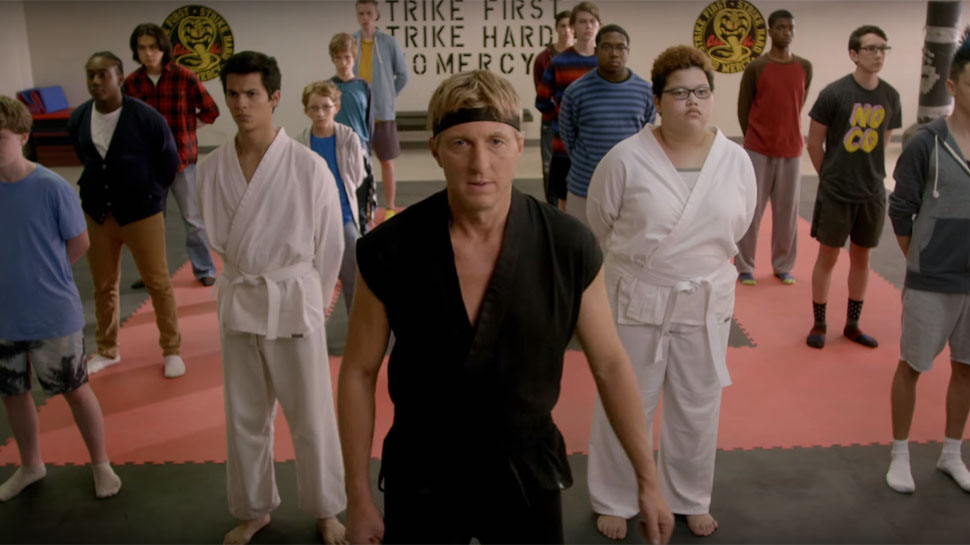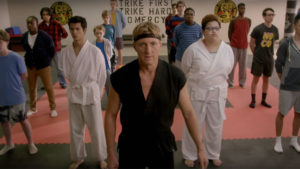No Sensei!
Funnier, smarter, and way more fun that it had any right to be. Nostalgic and contemporary, clever in the way it deals with the past in the present: Cobra Kai is my streaming surprise of the year.
It should have been a rushed reboot, leaning heavily on nostalgia for the popular 80s underdog 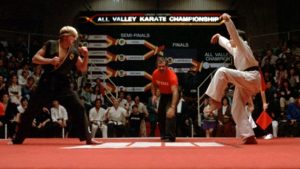 film. It should have been a couple of middle-aged, out-of-work actors desperate to ride that wave to make a quick buck. It should have had lazy writing, predictable plotting, and a black and white morality.
film. It should have been a couple of middle-aged, out-of-work actors desperate to ride that wave to make a quick buck. It should have had lazy writing, predictable plotting, and a black and white morality.
(Click on PDF icon, upper right, if you prefer to read this as black print on a white background)
It had none of these things. And I fucking loved it.
(Some spoilers to follow)
The premise is a down-and-out Johnny Lawrence (William Zabka), former nemesis of the Karate Kid Danny LaRusso (Ralph Macchio), has decided to re-open the notorious Cobra Kai dojo. After losing his job, his car, and much of his liver to pre-breakfast beers, Johnny finally breaks. Somewhere between a LaRusso car commercial on his television, and a belligerent step-father shoving a cheque at him and saying he wants Johnny out of his life forever.
Johnny Lawrence is a curiously sympathetic character. Unreconstructed, oblivious to the modern world and contemporary mores (he is hilariously politically incorrect). Drunk, ornery, stuck in the past. I was mildly annoyed, in watching the trailer, seeing what they had in mind. I thought to myself: you are not going to make me like Johnny Lawrence, that douchebag.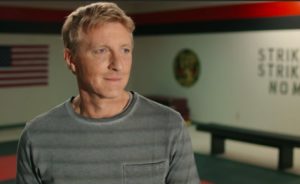
Reader, they made me like that douchebag.
I said to myself: they better not make Daniel LaRusso, the Karate Kid, the bad guy. Thankfully, they did not make him the bad guy.
Instead, they made them both flawed and redeemable. They both put in strong performances. Zabka, in particular, surprised me, able to shift between comedy, regret, belligerence, and pathos.
The plot doesn’t rest on these two old blokes, though. The bullied kids who turn to Cobra Kai for help are given their time on the stage. In particular, Miguel (Xolo Mariduena), mirroring the original film, is the kid from an immigrant family (with a hilarious pot-smoking grandmother) in the shitty apartment block who turns to the superintendent for self-defence training. His 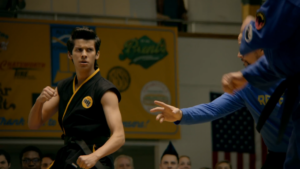 performance is a good one, as well, and his transition from (admittedly, far too attractive and physically fit) loser to tough guy is a credible and satisfying character arc.
performance is a good one, as well, and his transition from (admittedly, far too attractive and physically fit) loser to tough guy is a credible and satisfying character arc.
The storyline of Johnny’s son Robby (Tanner Buchanan) is underdone, with an interesting backstory somewhat wasted. The emotional impact of his later storyline is blunted somewhat, as we simply don’t know him well enough.
The humour is sometimes juvenile (Johnny gets drunk and draws a giant dick on a LaRusso motors billboard), sometimes subtle, but always very funny.
The beauty of this series is, until the last fight, you don’t know who to root for. There’s no good guy / bad guy set up. Both Johnny and Danny do bad things to each other, and good things for others. At one point, towards the end of the 10 episodes, the two go for drinks together at a bar to reminisce. And the viewer wants them to be friends. They laugh, talk about an old love, and it looks like they might even be able to leave the past in the past.
Until the present, in the shape of Johnny’s son, tears open all the old wounds.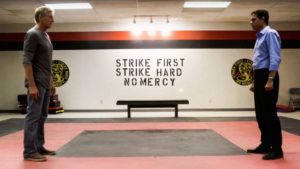
Johnny empowers the bullied, and they emerge as strong, vital young men and women. But some have gone too far – and the Cobra Kai lessons he teaches them: ‘Strike first, strike hard, no mercy’ are taken to heart. Johnny, who has the cynicism of age and experience to look at the three rules with a kind of ironic detachment, realises too late his mistake. Never quite believing in himself – indeed, believing deep down he is the loser – and therefore never quite understanding that the kids respect him, need him in their lives. Thus, by the end, he sees with dismay what they have turned into: Cobra Kai.
Danny, on the other hand, is as earnest as ever, though somewhat lost without his Sensei, Mister Miyagi. When he sees Cobra Kai re-open, he makes it his personal mission to shut it down again.
Cobra Kai is about adults stuck in the 80s (to my mind, the best decade to be stuck in), never quite shedding the formative experience of high-school. It is about fathers and sons and daughters, the 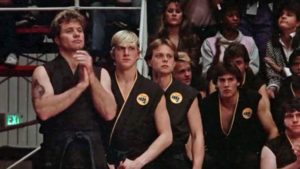 former never quite getting it right for the latter, no matter how hard they try (or don’t). It’s about the yearning for identity and purpose, in both the young and the old. It’s about earnest fun, and cornball nostalgia. More than anything, it is about heart.
former never quite getting it right for the latter, no matter how hard they try (or don’t). It’s about the yearning for identity and purpose, in both the young and the old. It’s about earnest fun, and cornball nostalgia. More than anything, it is about heart.
And Cobra Kai has a big, beating, mother-fucking heart. It cares about all the characters, and you can feel that care. It isn’t perfect, but quite frankly I don’t care and I wouldn’t want it to be. There are better-written, more pristinely-executed series out there (The Americans, Mister Robot, Westworld) I’ve enjoyed far less.
For Cobra Kai I laughed, pumped my fist and shouted for joy, and binged this motherfucker to the last.
Watch it.
